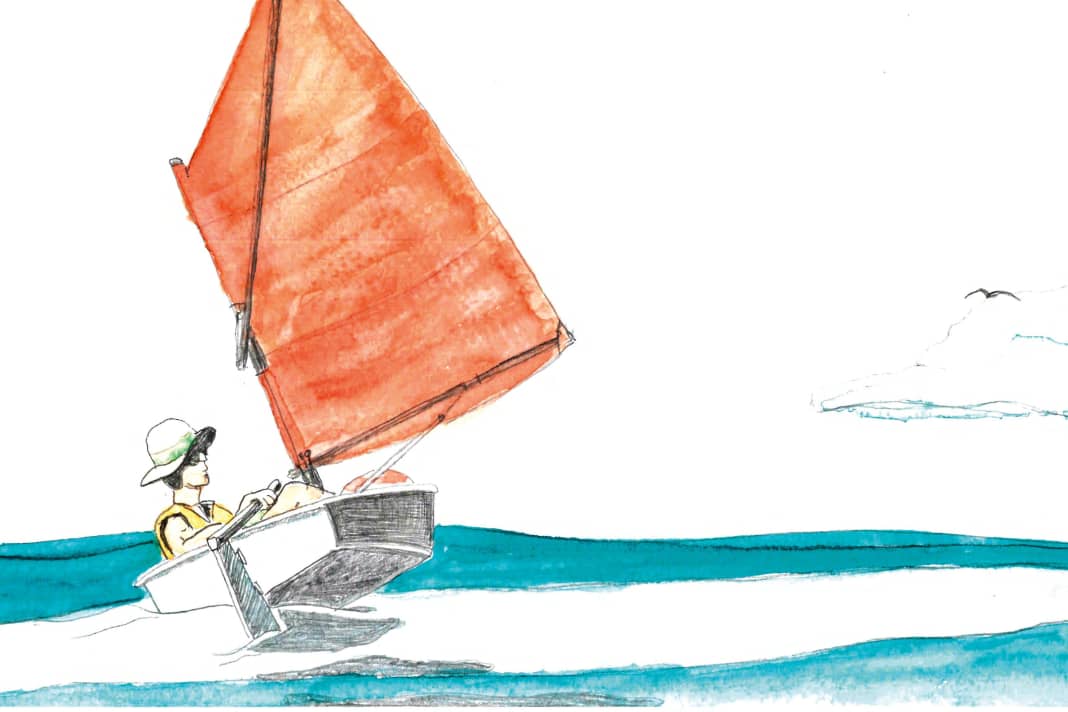





The small boat had been drifting along since it had left its mooring on the shore west of Friedrichshafen at dawn. A man in his mid-fifties sat leaning against the bow on the tiller. There was just enough wind to keep the sail on a room sheet course despite the windward heel. This meant that in the unlikely event of a gust, there would be no risk of capsizing. Despite the mild wind, he wore his lifejacket, as he had promised his wife.
The city had been visible for more than three hours before it finally disappeared into the haze. On a clear day, you would have been able to see the magnificent mountain range of the Swiss and Austrian Alps on the opposite side of Lake Constance. This time, the horizon and the haze merged seamlessly. Our sailor felt lost in space and time, and it was a wonderful feeling.
The "long stroke" to the other shore of Lake Constance
Less than an hour after setting off on his long-planned "great crossing", he heard voices. Were they hallucinations, as described in his circumnavigation books? He would never have thought it would happen so quickly. But there was no doubt. He could clearly hear voices from his childhood. In the middle of Lake Constance. "Ah vorzehl doch net" - "glaub mor doch" - "wenn es dor doch sag" - "liagsch du mi jetzd oh?" - "ha noi" ...
He turned round with difficulty in the small dinghy - nothing to see. Only after a second look round did he spot two stick figures on the horizon, rhythmically moving their arms up and down. Swabian stand-up paddlers, far out on the lake, engaged in an argument. He wasn't alone at all. His adventurous "long stroke" to distant shores suddenly seemed less heroic, and he decided not to tell anyone about this incident.
A policewoman inquired curiously why he was floating in the middle of the lake with "something like that"
The noise of an engine startled him. A police boat with a Swiss flag emerged from the haze. He feared trouble and waved in a particularly friendly manner as a precaution. A female officer stared down at him and enquired curiously rather than angrily why he was floating in the middle of the lake with "something like that". In the middle of Lake Constance, he was pleased to hear that he was already halfway to Romanshorn. "I just want to sail," was the simple answer. Wasn't that enough?
His address and the obligatory safety equipment were checked, then he had to undergo an alcohol test. Due to the boat's length of less than 2.50 metres, no registration number was required. The officers argued with each other, then he was handed a permanent marker and told to write his name and address clearly on the boat. After reminding him that anchoring at night was only permitted with all-round lights, they continued their journey towards the German shore.
The search for freedom and carefreeness drove him out
He bobbed in the wake and thought about how he could explain to the officers what he was doing. This rare opportunity to disappear from everyday life, simply for a few days and nights, to live the life of a temporary drifter. Carefree sailing. The Viking saying "Bound is the boatless man" could easily be refuted with the biography of our sailing hero. He had had many boats. But not the freedom to use them.
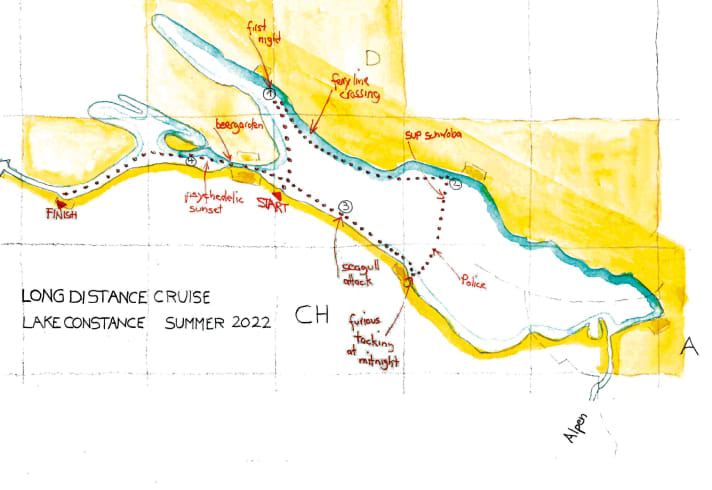
Growing up far away from the water, he could only sail his first boat - a Hobie Cat 14 model for "Big Jim" figures - on the flat roof of the garage after days of rain if he had blocked the drain first. At the age of twelve, he had wished for a sailing course for his birthday and spent a week in the summer holidays bobbing around with other children on an Allgäu lake in the calm.
Growing up far away from the water, he had already had many boats. The freedom to use them, not
Then finally, at the age of 14, a sailing trip with his uncle through the Danish South Sea and years later "around Rügen" shortly after reunification. This was followed by milestone trips for sailing licences during his studies and charter tours in Australia and the Caribbean, on the German Baltic coast and in the Swedish archipelago. He had already sailed across lakes on catamarans and was allowed to sail as a crew member in classic regattas on Lake Geneva. As a castaway, he had drifted on a capsized Laser in the Ría de Betanzos north of La Coruña and had undertaken wonderful travelling trips on beach catamarans with his wife. He had already designed and built several boats, but had sold or given them away after the test trip due to lack of space. The annual charter holiday with the bored children was characterised by manoeuvring stress due to a lack of practice, and on the men's trips with colleagues he always felt like he was in a competition. He was unable to move and assemble his self-designed six-metre catamaran, which was moored in front of the house, on land alone.
What more do you need than an optimist?
None of this corresponded to the boundless sailing freedom of his daydreams. But now everything was different. He was able to hoist his new toy onto the roof of the car himself with cushions underneath. On the beach, a simple fender was sufficient for land transport. There were no mooring costs. Nor did he have to worry about losing or damaging a valuable boat. There was only one sheet and one tiller.
What more could you need to experience water, wind, waves and endless expanses? Two years ago, he spontaneously discovered the 43-year-old GRP Optimist on the scrap heap of a sailing school on Lake Neuchâtel and bought it from its owner for 250 SFr.
During the winter, he optimised the new acquisition for his project and removed the bulkhead on the port side of the boat. This small change made room for his air mattress, transforming the children's boat into a minimalist touring dinghy with a narrow berth for a person no more than 1.80 metres tall. There was space on the starboard side for luggage for a trip lasting several days.
The air mattress between the centreboard box and the buoyancy chamber turns the children's dinghy into a minimalist cruising boat
The worn-out racing sail had been replaced by a red one-design sail with a simple cut. The layers of fibreglass on the underside, exposed by years of sailing school use, were laminated over with fabric patches and epoxy resin and given a thick coat of varnish. The tiller had to be extremely shortened so that there was enough room to heave the body of an adult of an appropriate age from one side of the hull to the other when tacking and jibing.
Anyone who has ever tried to attach the rudder to a sailing dinghy with equally long upper and lower rudder pins in choppy water will be familiar with the problem. It is almost impossible because both holes have to be fitted at the right height at the same time, and that with components moving violently against each other. The upper stainless steel bolt was therefore shortened by five millimetres using a hacksaw so that the hole of the lower rudder fitting can first be placed and fixed on the bolt and then there is still enough clearance between the upper bolt and the mounting hole to thread in the upper fitting.
The centreboard has been shortened by 20 centimetres without any noticeable increase in drift. The notch for the tensioning rubber, with which the centreboard is held up on the downwind course, was deepened. On a rainy night, the raised centreboard can thus serve as a "ridge" for a tarpaulin, which is then held in place by two further tensioning rubbers across the bow and stern. The same rubber straps make the dinghy self-steering while travelling.
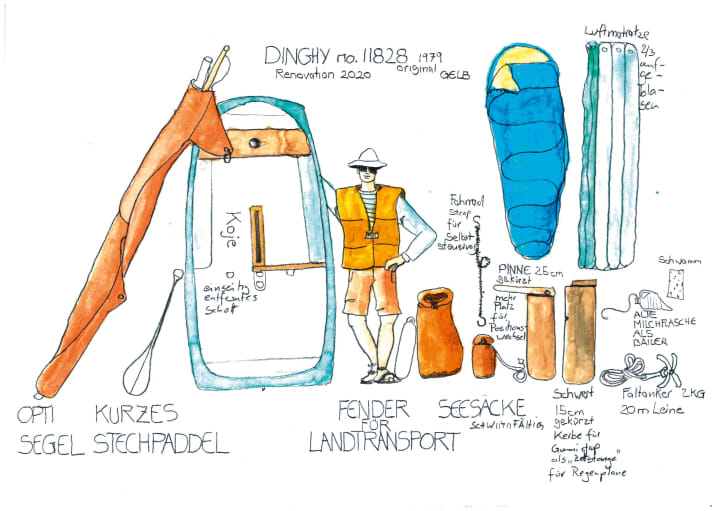
An Optimist as a travelling dinghy
The new name was intended to identify the Opti as a travelling dinghy. It took quite a while to find it. "Circumnavigator", "Roamer", "Escape Box", "Tramp", in the end he decided on the melodious name "Knulp", the main character of a novel by Hermann Hesse. Knulp is an aging tramp who returns to his hometown and compares his restless life with that of the settled citizens. The aimless wandering described so idealistically in this story was to become the dinghy's new task.
Before nightfall, he had finally approached the Swiss shore of Lake Constance, and a light breeze from the north set in. As he had arrived a little to the east of Romanshorn, he could clearly see that the shoreline at the harbour entrance changes from north to northwest, which explains the name "Horn".
Unfortunately, he had arrived about 300 metres below this horn and spent the next two hours desperately trying to round the obstacle while keeping an eye on the harbour entrance. It was getting dark. He didn't want to give up. An angler shouted something to him from the harbour wall, but our sailor didn't answer. He didn't want his little long-distance sailing adventure to be spoilt by the inviting harbour and the restaurants he was sure to find there.
In his mind, he put himself in the position of the fishermen on the pier. Darkness as far as the lights on the German shore, the rods cast and fixed. Silence. Then an old man appears on his children's sailing boat, disappears again from the glow of the harbour lights after a turn, only to reappear after another five minutes. The spectacle is repeated several times without the red sail appearing to move. The things you can experience when fishing!
A few minutes after the bells of St John's parish church had announced the dawn of the new day, he was finally able to pass the horn and followed the coastline, which was now running north-west, close to the wind.
Night quarters on a buoy off Kesswil
Soon a black mass protruded over the dark blue shoreline into the lake, and he reached for the torch to get a clearer view. A private villa jutted out into the lake. He had shone the light directly into the open bedroom window. The room light was switched on, a shadow appeared at the window, and an angry voice bellowed into the night. He replied with a weak apology, quickly switched off the torch and disappeared under the cover of darkness. Shouting back a flimsy explanation would have been a further nuisance.
Sitting on the starboard side, he looked at the shore with the streetlights of the villages on the Swiss shore. Behind his back were the black waters of Lake Constance and a few lights on the distant German shore.
The wind blew stronger and more and more water found its way into the boat. The cold slowly crept under his clothes. After more than twelve hours of cramped sitting in the box, his wanderlust was quenched for the moment. Tired and frozen through, he set off in search of a free buoy and found one off the village of Kesswil. He dried the bottom with a sponge. An air mattress bridged the still uncomfortable GRP hump of the removed bulkhead, and then he slipped into his sleeping bag and wedged himself between the centreboard box and the built-in buoyancy chamber.
A slap in the face awakens the optimist-adventurer
This time, the crashing of the waves against the flat Sharpie floor, which had upset him the night before, didn't stop him from falling asleep immediately. A blow to the face brutally woke him from his sleep. A piercing screech filled the night, followed by wild flapping. He cried out. The mighty shadow of a bird disappeared amid outraged cries. He felt something wet and warm on his cheek, and an odour came to his nose that he could immediately identify.
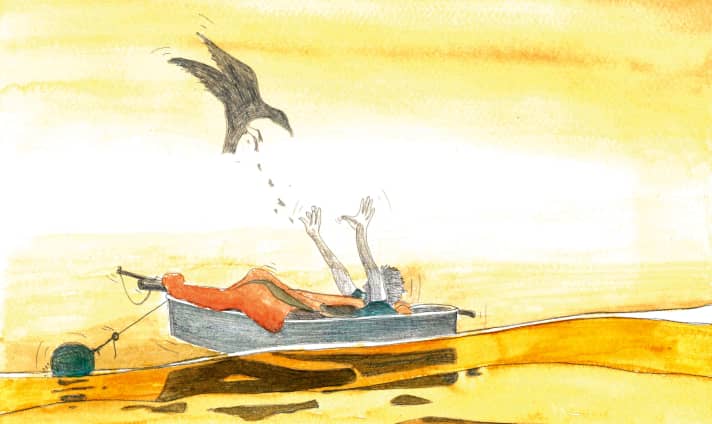
With a pounding heart, he switched on the torch and tried to get rid of the white-greenish stuff that had smeared his face, the inside of his boat and his sleeping bag. With plenty of adrenalin in his veins, he was then fit enough to continue his journey. He didn't want to be a target for seabirds a second time.
The first signs of dawn could be seen behind him as he sailed a short distance along the coast. His provisions, consisting of two litres of water, eight chocolate bars, home-dried apple rings and chocolate-covered puffed rice squares, had already been consumed the night before, and he was longing for a proper breakfast. However, it was far too early to find an open kiosk for a coffee and something to eat.
So far, he has been more than satisfied with his little escapade. It included everything an adventurous family man could wish for: Solitude, sleeping under the stars, a big blow across Lake Constance, unexplored waters, encounters with wild animals and natives and finally beer and schnitzel in a down-to-earth restaurant on the first evening.
The sun rose behind his back. A short time later, a campsite came into view and he landed on the shingle beach, dragging his dinghy over a fender until it was a few metres above the water level. Of course, there is no tide on Lake Constance, but on a previous trip a motorboat wave had pulled his dinghy back into the water, so he had to swim behind it. And finally, an English proverb says: "A real sailor ties up his boat, even if it's in a cornfield!"
Lake Constance gets a current in the Constance funnel
The restaurant was already open. The first permanent campers were already sitting at breakfast, discussing the latest news and watching the newcomer suspiciously. He ordered croissants with butter and hazelnut cream, Swiss Ovaltine, a coffee, another coffee, followed by scrambled eggs with bacon and an orange juice. On the way to the boat, he carried two more bottles of water and lots of chocolate.
Now the Konstanz funnel lay before him. At its end, Lake Constance merges into a section of the Rhine under the bridges of Constance for a few kilometres until it flows back into the Untersee. The boat rocked violently in the criss-crossing swell of the numerous motorboats.
In the "funnel", the wind shifted and blew stronger, forcing him to cross. When he felt the current of the Rhine pulling him towards the first bridge in Constance, he lowered the mast as he did not know how high the bridge passage was. A rafting trip began between bridge piers and excursion boats. After passing under the motorway bridge, he set the sail again and drifted with the current.
The former Strohmeyer factory appeared on the right-hand side. This company was known in the 1960s and 1970s for the development and production of large tent roofs. Built directly on the banks of the river, it was later converted into a bar and beer garden. Ideal for an early lunch break.
Sailor's yarn is part of a sailor's life
Here, for the first time on the trip, he experienced the lack of admiration for his tour in the children's boat with light luggage. Having three days off - with no obligations and no predetermined destinations - sounded desirable to the father of a holidaying family at the next table. Our sailor took a firm grip on his shandy glass, leaned back and began to boast about his journey.
Even as he spoke, his alter ego reminded him of the family holiday in Brittany three weeks earlier, where boastful surfers were talking about three-metre waves, even though the waves he had to ride were 1.5 metres at best. How he had laughed and felt superior when he was able to steal the show on their shortboards in these conditions with his self-made hand surfboard and flippers.
Now it was his turn. He watched himself as he described the journey with great exaggeration. He didn't even feel bad about it, as spinning yarns had always been an integral part of a sailor's life. His mother and children were quickly bored by his detailed explanations. His father, on the other hand, found it hard to hide his desire for a similar voyage.
His unplanned extended appearance as a local hero and an unaccustomed second beer made time fly by, and when he finally resumed his journey, it was late afternoon. The river was lined with barbecues, anglers, rowing teams, sea kayakers and passenger boats. The smell of grilled meat combined with the special light of the evening sun, topped off with the feeling of being a hero, sent him floating towards the lower lake.
Paddle escape from the mosquito plague
He reached Gottlieben, a picturesque little village on the Swiss side, at sunset, and the reeds of the Wollmatinger Ried nature reserve glowed in the light of the low sun. The wind died down and small insects filled the air - not stinging ones, but so many that it was hard to breathe.
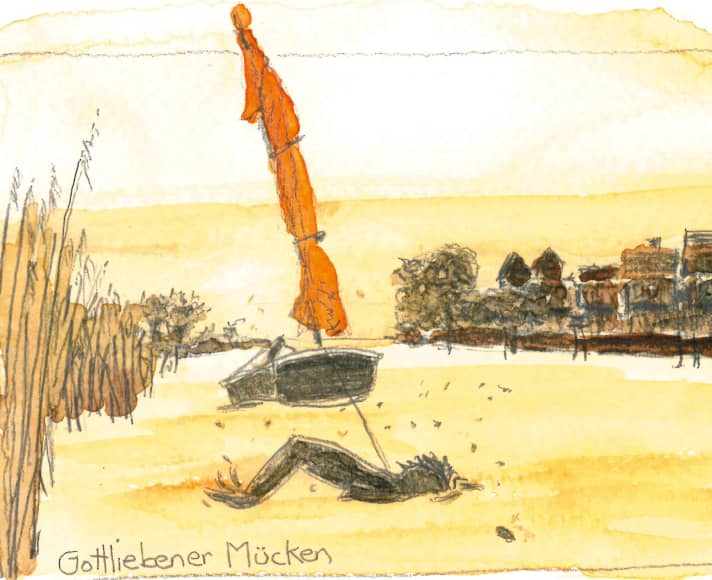
He began to paddle. Fixing the tiller with a simple bicycle strap, he passed a bird-watching platform and then pushed his way through a flock of swans with frenetic strokes. The cloud of insects grew denser and began to penetrate his nose. He tried in vain to escape. In desperation, he jumped into the water with a rope around his waist and dragged the boat behind him for a while. This enabled him to make progress and escape the beasts.
The clouds, illuminated from below by the setting sun, were miraculously reflected in the lake. The water was warm, black with flashing orange waves. Like a dream. He could have swum on like this forever. In complete darkness, he heaved himself back into the boat and used the black shadows of the bird sanctuary buoys to orientate himself. Otherwise, he could only see the lights of the villages on the Swiss shore of Lake Constance and those of the cars on the causeway to the island of Reichenau.
He alternately paddled and sailed for a while until the anchor was dropped at around 11 p.m. in complete darkness and no wind. The shore was close and the 2.5-kilogram folding anchor touched the ground after just a few metres. He used a street lamp on the island as a bearing. He watched the light for a few more minutes and when it did not change its position, he went to sleep. The next morning he saw the folding anchor lying folded up on the ground. With no wind, its weight alone had held the boat in place.
The optimist-adventurer wanted to be alone with himself and the world
The lower lake was covered with a low-lying lead-coloured cloud cover. The smooth sea had also taken on the same colour. He set sail and drifted towards the Höri peninsula. Alone in the centre of the lake, he took off his clothes, immersed himself in the leaden surface, and later the sun's rays slowly penetrating the cloud layer dried his body. In perfect peace and solitude, he ate a simple but unforgettable breakfast with lots of chocolate. Over the next few hours, light winds alternated with complete calm, and sometimes he used the paddle to propel himself - just for the feeling of moving on.
Around midday, he passed Gaienhofen. Instead of visiting the poetry museum there, as originally planned, he simply sailed on into the narrowing lake.
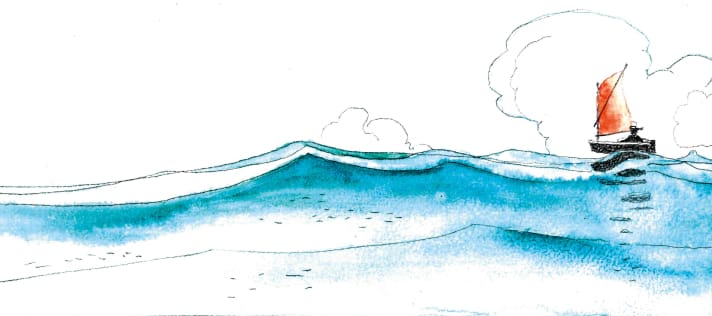
He wanted to be alone with himself and the world and just sail; he stayed close to the shore and admired the anchored boats and houses along his course.
Shortly before Stein am Rhein, the beginning of the current could be felt. This is where the Rhine leaves the lake and plunges some 20 kilometres downstream over the cascades of the Rhine Falls towards the North Sea.
More than satisfied with his adventure, he wanted to be alone with himself and the world and just sail
The anchor dropped one last time off the island of Werd with its monastery, and the Opti sailor jumped into the cool waters of Lake Constance to round off his long-awaited trip. More than satisfied with his adventure, he finally rang home. He asked if his wife would like to pick him up. He was now ready to dive back into family life with renewed vigour.
Text & Illustrations: Detlef Teufel

